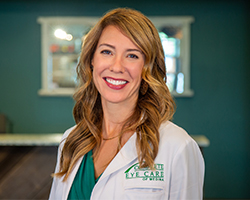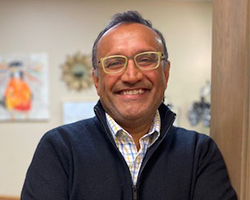| |
 |
| Gina Wesley, OD.
|
|
At Complete Eye Care of Medina in Minnesota, the importance of sustainability continues to grow in importance for both the optometrists on staff and for its patients, which are increasing curious as to what steps their eyecare provider is taking in this area.
“Yes, I think the environment around sustainability and companies has become more important,” said Gina Welsey, OD, and an optometrist on staff at Complete Eye Care. “The ability for a company to demonstrate sustainable practices is incredibly valuable in showing they care and what they value long-term.
“Sustainability means working with ophthalmic companies who are thinking into the future, knowing that what choices they make now impact people for years to come. This can be related to materials, but also services that are in the realm of prevention and long-term outcomes. It can be related to the environment or social outcomes in general.”
According to Dr. Wesley, at Complete Eye Care of Medina, one of the biggest areas of sustainability involves recycling programs for its contact lens users.
“I think the most common aspect of sustainability with patients is in our contact lens area for waste,” said Dr. Wesley. “Ninety percent of our lens wearers are in daily disposables, and we promote and assist patients in taking advantage of the free used contact lens, eyecare and lens care recycling programs offered by Bausch + Lomb, which is through a collaboration with TerraCycle.
“These programs recycle all brands of used contact lens packaging (top foil, blister pack) and the lenses themselves, as well as used all brands of eye drop single dose units, lens cases, lens solution caps and certain eye drop multi-dose bottles. Patients are happy to know these materials are being repurposed into items like picnic tables and benches.”
According to Dr. Wesley, Complete Eye Care of Medina is an official recycling center of the Bausch + Lomb ONE by ONE recycling program, “which is wonderfully generous in allowing all lenses from any company to be recycled through their program. We also use the Bausch + Lomb Biotrue Eye Care Recycling program to recycle our used eyecare and lens care materials.
“We not only recycle with special programs, but we also work to partner with companies who are B-corp certified and have the same long-term goals in sustainable practices for not only the environment but for the health of our patients.”
| |  | | | Raj Patel, OD. |
As one of six optometrists on board at Vancouver Vision Clinic in Vancouver, Wash., Raj Patel, OD, FAAO, is always on the lookout for emerging trends and areas of concern among his patients. Currently near the top of that list is “sustainability,” which continues to grow in importance at his practice.
“Sustainability is a growing priority for patients. It feels like since the COVID pandemic began, there are more people pursuing sustainability (green) behaviors consistently,” said Dr. Patel. “I imagine the use of disposable masks, gloves, plastic partitions, and bottles of hand cleaners has brought forward more intention around increasing sustainable behaviors. In casual conversations with our patients, friends and neighbors we will probably all see that there is more behavior change around everyone's own sustainability practices.
“Really, sustainability is how we leave the earth for our kids. I do think enhanced awareness of environmental issues and a sense of responsibility is contributing to our patients and staff's purchasing decisions. Most people believe in recycling and are taking notice of the need to make a positive impact on the environment and want to do their part.”
Sustainability initiatives at Vancouver Vision Clinic include contact lens recycling bins placed throughout both of its offices, and recycling of paper, contact lens blister packs, plastics, cans and cardboard.
“Our contact lens technicians and doctors message our patients on the ability to recycle their contact lens packaging in our offices,” Dr. Patel said. “And one of our offices has motion sensor lights throughout most of the building that help curb energy use.”
While sustainability initiatives are top of mind for many eyecare patients, Dr. Patel and his staff realize that others may need some guidance.
“First it's important to know that sustainability does not resonate the same with all,” he said. “Those that the message is important to are very enthusiastic and tell others. We let our contact lens patients know that the blister packs, foil, used contact lens can all be recycled by bringing those to our office. Patients are commonly enthusiastic about this. Overwhelming, patients like the recycling efforts and it makes them feel better about using daily disposable contacts. Managing plastic wastes, and improving recycling efforts figures prominently in our patients plans for sustainability," he said.
| |